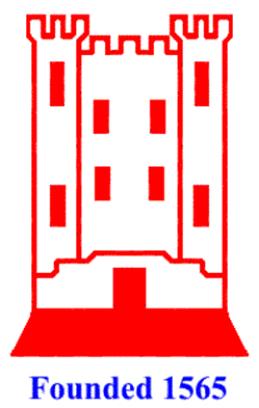Mathematics in the Early Years

Maths is an important part of learning for all children in the early years and receiving a good grounding in maths is an essential life skill. Introducing maths to children from an early age helps to develop their understanding of all elements of problem solving and reasoning in a broad range of contexts.
Maths in the Early Years Foundation Stage Curriculum comes under two strands:
Number and Numerical patterns
The statutory educational programme for mathematics in Early Years
Mathematics Developing a strong grounding in number is essential so that all children develop the necessary building blocks to excel mathematically. Children should be able to count confidently, develop a deep understanding of the numbers to 10, the relationships between them and the patterns within those numbers. By providing frequent and varied opportunities to build and apply this understanding – such as using manipulatives, including small pebbles and ten-frames for organising counting – children will develop a secure base of knowledge and vocabulary from which mastery of mathematics is built. In addition, it is important that the curriculum includes rich opportunities for children to develop their spatial reasoning skills across all areas of mathematics including shape, space and measures. It is important that children develop positive attitudes and interests in mathematics, look for patterns and relationships, spot connections, ‘have a go’, talk to adults and peers about what they notice and not be afraid to make mistakes.
Numbers Early Learning Goal
Have a deep understanding of number to 10, including the composition of each number. Subitise (recognise quantities without counting) up to 5. Automatically recall (without reference to rhymes, counting or other aids) number bonds up to 5 (including subtraction facts) and some number bonds to 10, including double facts.
Numerical Patterns Early Learning Goal
Verbally count beyond 20, recognising the pattern of the counting system. Compare quantities up to 10 in different contexts, recognising when one quantity is greater than, less than or the same as the other Quantity`. Explore and represent patterns within numbers up to 10, including evens and odds, double facts and how quantities can be distributed equally.
Our curriculum meets all the requirements of the legal document called the Statutory Framework for the Early Years Foundation Stage. The Statutory Framework allows Practitioners to decide what they want children in their setting to learn, and the most effective ways to teach it. We have designed our curriculum which addresses the 7 educational programmes and prepares them with all the knowledge and skills to meet the expectations of the 17 ELGs. In the summer term the Early Years teacher completes the statutory EYFSP – Early Years Foundation Stage Profile- they make a judgement of ‘expected’ or ‘emerging’ against each of the 17 ELGs.
Our Early Years Curriculum at William Gilbert school prepares children to meet the expectations of the Early Learning Goals (ELGs) in mathematics by the end of the Foundation Stage. The Early Years curriculum is formed by 12 curricular goals, two of which aim to develop children’s mathematical skills.
Curricular Goal 11 – Count
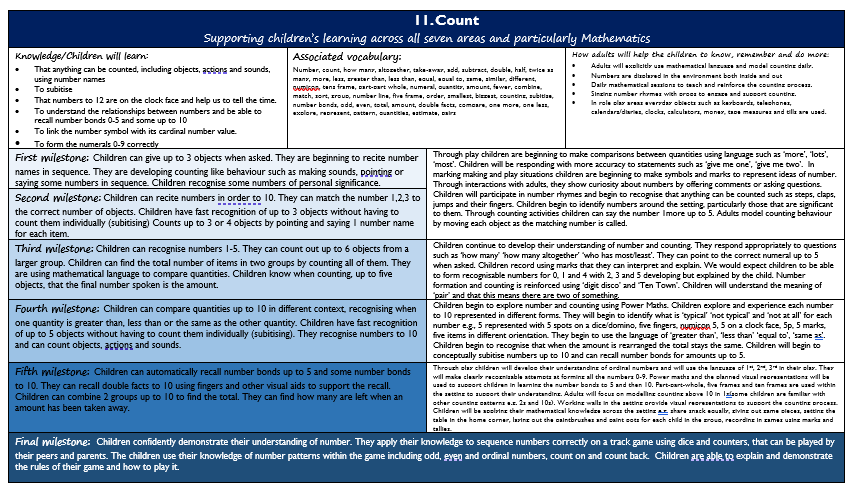
Curricular Goal 12 – Investigate
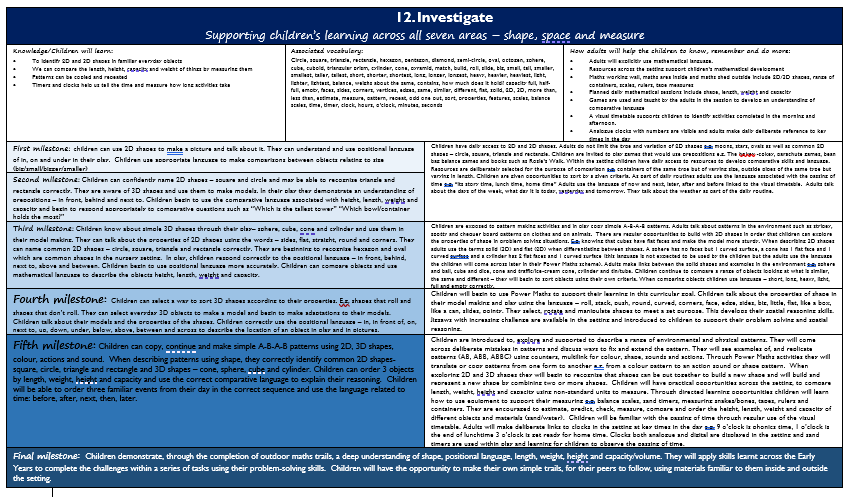
As with all other areas of learning, the teaching and learning of mathematics in our Nursery and Reception classes takes place both indoors and outdoors through a wide range of practical and ‘hands on’ activities.
Teachers use their knowledge and expertise to plan for a high quality learning environment which provides children with lots of opportunities to explore different aspects of number and shape, space and measures and learn new concepts. The children have a wide range of structured play resources available to them throughout the year – this is known as ‘continuous provision’. For example, children may learn about capacity through their water play, both indoors and outdoors. In addition to the opportunities for child initiated play indoors and outdoors, staff plan adult led activities for groups of children and individuals based on their observations of what children know and can do. They plan activities to address any misconceptions that have arisen and to introduce new concepts.
Through adult led activities children are introduced to a range of visual representations to understand a concept in greater depth and gain mastery. Using the schools’ Power Maths scheme children are introduced to the visual representations they will use throughout their mathematical journey at William Gilbert.
Visual Representations

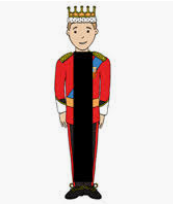
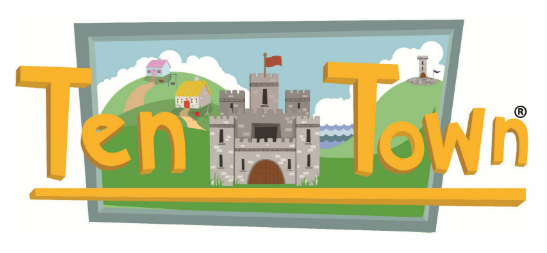
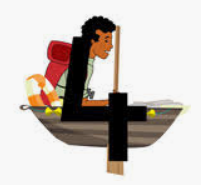
Within the nursery class children are introduced to numbers through the unique stories, rhymes, animated characters and interactive games from the maths resource ‘Ten Town’.
Memorable characters such as King One, Fiona Five and Sir Seven are designed to help children to improve their number recognition and formation, while reducing the problem of number reversal.
Ten Town has the potential for exciting and meaningful cross curricular learning and development across of all the key areas of the revised EYFS framework but focused through a mathematical base. Whether it’s exploring the world around us with Freddie Four, finding out about the past with King One, or stimulating discussion about fitness and healthy eating with Fiona Five.
Ten Town is designed specifically for Reception maths. As well as introducing the numbers up to 20, it covers topics such as size, weight, time, money, shapes, patterns, capacity, positional language, simple calculations and much more! It supports our early years maths curriculum in a fun and engaging way.
This is the link address https://www.tentown.co.uk/
Power Maths
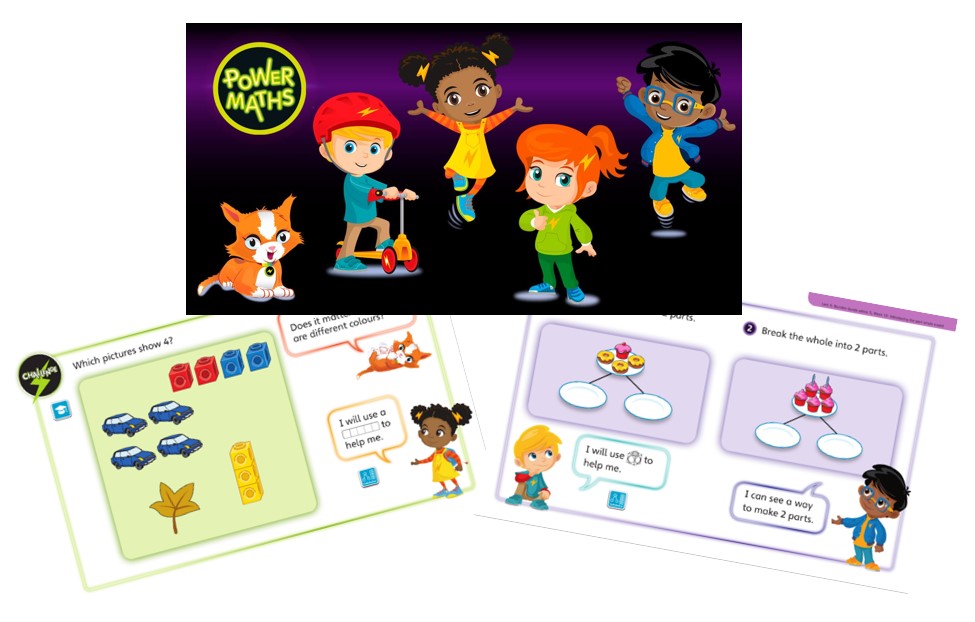
At the heart of Power Maths is the belief that all children can achieve. It’s built on an exciting growth mindset and problem-solving approach. Power Maths is an interactive, whole class teaching model. It encourages precise mathematical language and allows children to deepen their understanding as far as they can. In reception class, pupils meet the Power Maths characters, are introduced to their growth mindsets, and begin to experience the visual representations and mathematical concepts.

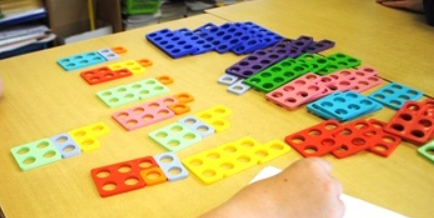
Further support for parents
There are a number of websites that can be used at home to support maths, below are some that we recommend.
